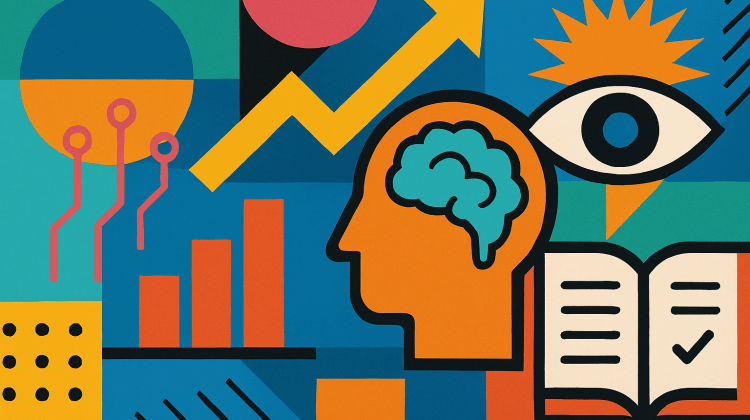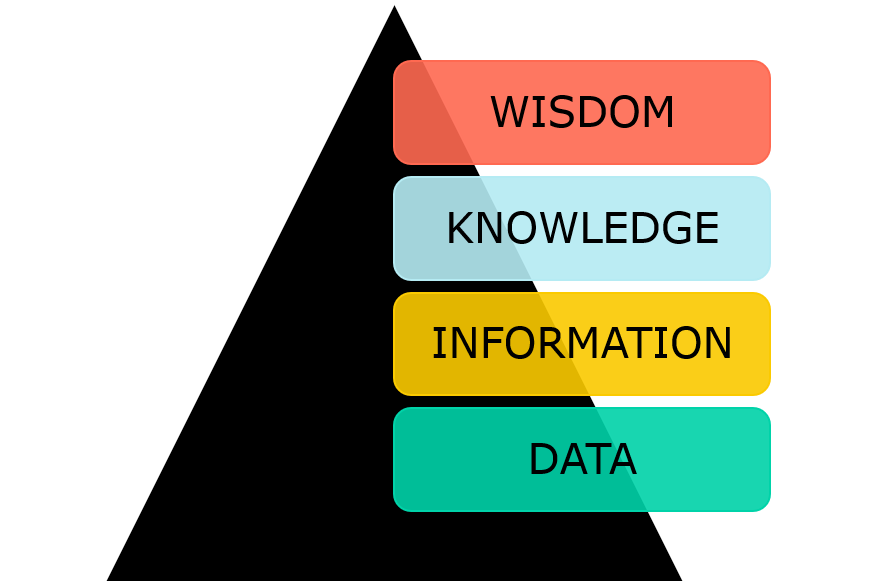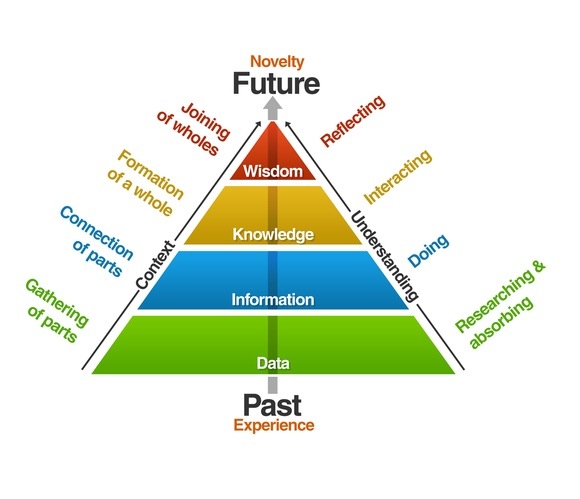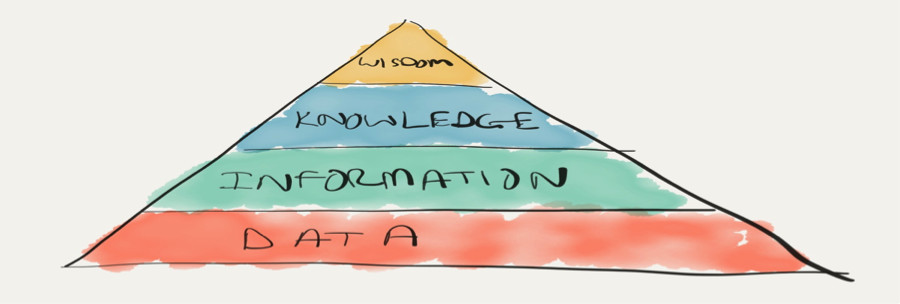We are living in a time when information is infinite, yet wisdom feels rare. Every second, our devices pull in data from millions of sources—text messages, social media, cloud drives, news feeds. But how often do we pause to ask: “Am I just consuming… or am I understanding?”
At Remin.site, we believe that the things we leave behind—our stories, values, and lived experiences—are far more valuable than terabytes of raw data. To truly preserve your legacy, we must understand the difference between information and wisdom in this digital age.
Understanding the DIKW Pyramid
To uncover the gap between information and wisdom, we begin with a simple but powerful model: the DIKW Pyramid. It stands for Data → Information → Knowledge → Wisdom.

This model illustrates how raw data is gradually transformed into wisdom. But in our hyperconnected world, many people get stuck somewhere between information and knowledge—and never reach wisdom.
“We are drowning in information, while starving for wisdom.” — E.O. Wilson
What Is Data? The Foundational Layer
Data is the simplest, most basic form of content. It is raw, disconnected, and without context. Think of it as puzzle pieces spilled on a table: numbers, names, timestamps, GPS coordinates. On their own, they’re meaningless.
- “24, 36, 45” — just numbers.
- “John, Paris, 11:00 AM” — without context, just noise.
But once we start organizing it, we take a step upward.
From Data to Information
Information happens when data gains structure and context. When you connect the dots, patterns begin to emerge:
- Data: “90 bpm”
- Information: “Your heart rate is 90 beats per minute.”
This is the level where most of the digital world stops. Your phone, your watch, your inbox—they’re full of information. But does that mean you know something? Not quite.
Where Knowledge Fits In
Knowledge emerges when you interpret information based on your experience. You start drawing conclusions, noticing cause and effect, and applying lessons:
- “90 bpm while resting is unusual—maybe I’m stressed.”
- “I’ve seen this pattern before. It usually leads to burnout.”
This is the realm of understanding, and it’s where human insight enters the equation. Machines can give you knowledge, but only humans can use it wisely.
How Wisdom Emerges
Wisdom is the top of the pyramid. It’s not just about understanding—it’s about judgment. It’s knowing when to act, how to act, and why something matters at all.

Wisdom takes experience, ethics, reflection, and empathy. It’s not something you Google—it’s something you grow into.
The Role of Technology in Shaping Understanding
Technology today gives us instant access to all levels of the DIKW pyramid—except wisdom. Why? Because wisdom requires something digital tools can’t offer: human discernment.
Tools vs Thinking: Tech as an Extension, Not a Replacement
Your smartphone can track your sleep, heart rate, and productivity. But it can’t tell you when it’s time to take a break, reconnect with loved ones, or listen to your gut.
“Technology gives us access to all the answers—but not the wisdom to ask the right questions.”
Too often, we confuse information access with intelligence. We Google, we scroll, we absorb—but without reflection, we’re just full, not fulfilled.
Algorithms, AI, and the Knowledge Trap
Modern algorithms curate what we see and think we know. But the more personalized our feeds, the smaller our perspectives can become. This is the heart of the knowledge trap.

AI doesn’t care about context, compassion, or consequence. It optimizes for speed, relevance, and profit—not truth or meaning.
At Remin.site, we see this as a digital danger: the illusion of knowing everything while understanding nothing. Wisdom is the antidote.
From Information Overload to Meaningful Insight
In a world flooded with data, we need to be more than informed—we need to be intentional. Let’s explore how we can sift through the noise and find meaning.
The Cost of Too Much Information
Here’s what unchecked information does to us:
- Paralyzes decisions — Too many options mean we hesitate or defer important choices.
- Drains attention — Notifications hijack focus and fragment our thinking.
- Desensitizes meaning — The more we scroll, the less we feel.
Over time, this weakens our ability to make wise, value-aligned decisions. We know more, but understand less.
Curation and Context: The Antidotes
To regain clarity, we must practice digital discernment. That means:
- Curating input — Unsubscribe, unfollow, filter your digital diet.
- Seeking context — Ask “why does this matter?” not just “what does this mean?”
- Creating space — Silence is fertile ground for wisdom.
As you reflect on the knowledge you gather in life, consider: is it something to store, or something to share? Remin.site helps you capture not just your memories, but the values and wisdom behind them—for future generations to learn and grow from.
Continue reading in Part 2: Cultivating Wisdom in a Hyperconnected World →
Cultivating Wisdom in a Hyperconnected World
In a digital world that never sleeps, cultivating wisdom becomes an intentional act. While information is everywhere, wisdom is still handcrafted—shaped by our reflections, relationships, and values. At Remin.site, we believe wisdom isn’t just learned—it’s lived, and it deserves to be passed on.
Reflective Thinking and Critical Filtering
Wisdom doesn’t come from fast consumption—it comes from slow contemplation. Here’s how you can begin to nurture it:
- Pause before reacting — Give your mind the chance to process, not just respond.
- Ask deeper questions — “What’s the long-term impact?” or “What would I advise someone else to do?”
- Practice digital mindfulness — Be aware of how and why you consume content.
Instead of being a passive receiver, become a curator of your mental space. Just as we choose what we eat, we must also choose what we feed our minds.
Emotional Intelligence and Ethical Judgment
Wisdom includes not just intelligence, but the heart. Emotional intelligence—empathy, humility, listening—is crucial in how we interpret and apply what we know. Without compassion, knowledge can become cold or even dangerous.
Consider how your actions affect others. Reflect on values. And most importantly, share your insights—not as facts, but as experiences that matter.
“Wisdom begins in wonder.” — Socrates
At Remin.site, our mission is to preserve not just what you did in life—but why it mattered. Your digital legacy should include your values, your kindness, your hard-earned insights. Because those are the things that outlast trends and timelines.
Conclusion: Why Wisdom Matters More Than Ever
The digital age is defined by its access to data and information. But access is not enough. If we want to live with purpose—and leave something truly meaningful behind—we must climb the pyramid from information to wisdom.
Wisdom is what transforms scattered facts into a legacy. It’s how you know what to share, what to keep, and what to let go. And it’s the only thing that grows more valuable as it’s passed on.
That’s the mission behind Remin.site. We don’t just preserve your stories—we preserve the meaning behind them. Because death is not the end. It’s the beginning of how your wisdom lives on.
Final Thoughts: From Consuming to Becoming Wise
In a world of constant input, becoming wise is a radical act. It means stepping back. Asking better questions. Choosing intention over impulse. And above all, it means remembering that what you leave behind—your insights, your compassion, your truth—matters.
So don’t just consume. Reflect. Don’t just store. Share. Don’t just know—be wise. Let your life mean something long after you’re gone.
Start building your legacy of wisdom today at Remin.site.
Frequently Asked Questions (FAQs)
Is wisdom the same as intelligence?
No. While intelligence involves cognitive ability, wisdom includes judgment, ethics, and experience. You can be smart without being wise—and vice versa. Wisdom is often a result of lived experience and reflection.
Can AI ever be wise?
Artificial Intelligence can process information and simulate knowledge, but it lacks the emotional depth, ethical grounding, and human experience required for true wisdom. It can assist us, but it can’t replace us in making deeply human decisions.
What are examples of wisdom in digital life?
- Choosing to disconnect and rest instead of scrolling endlessly
- Responding with empathy in an online debate
- Leaving behind a legacy that reflects not just what you did, but what you believed
How can I turn my knowledge into wisdom?
Reflect often. Seek feedback. Prioritize values over opinions. Document your experiences and what they’ve taught you—not just for yourself, but for the generations after you. A tool like Remin.site helps you capture that journey meaningfully.
Want to preserve not just your data, but your wisdom? Join the movement at Remin.site. Because the future deserves more than just information—it deserves your story.
